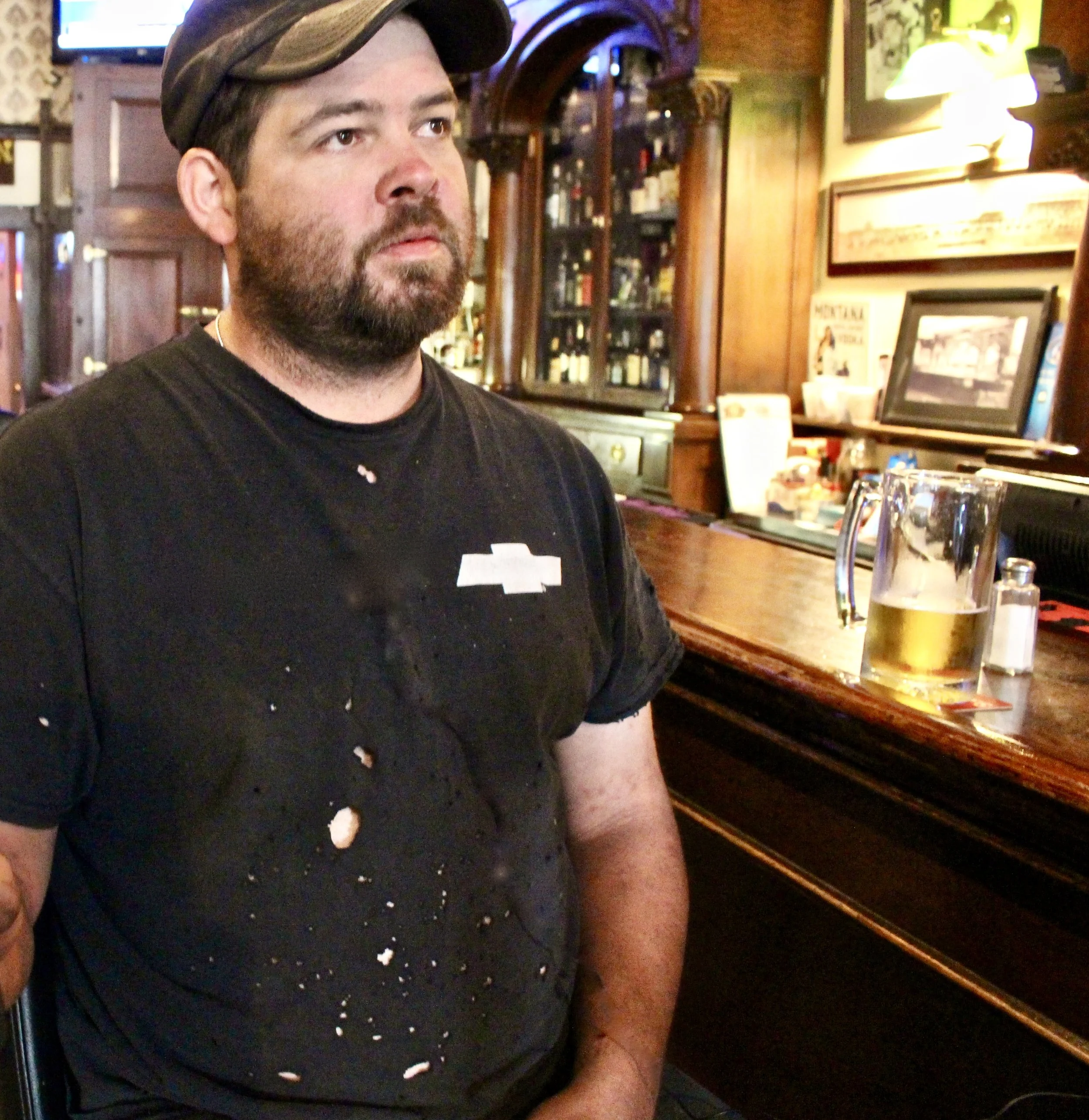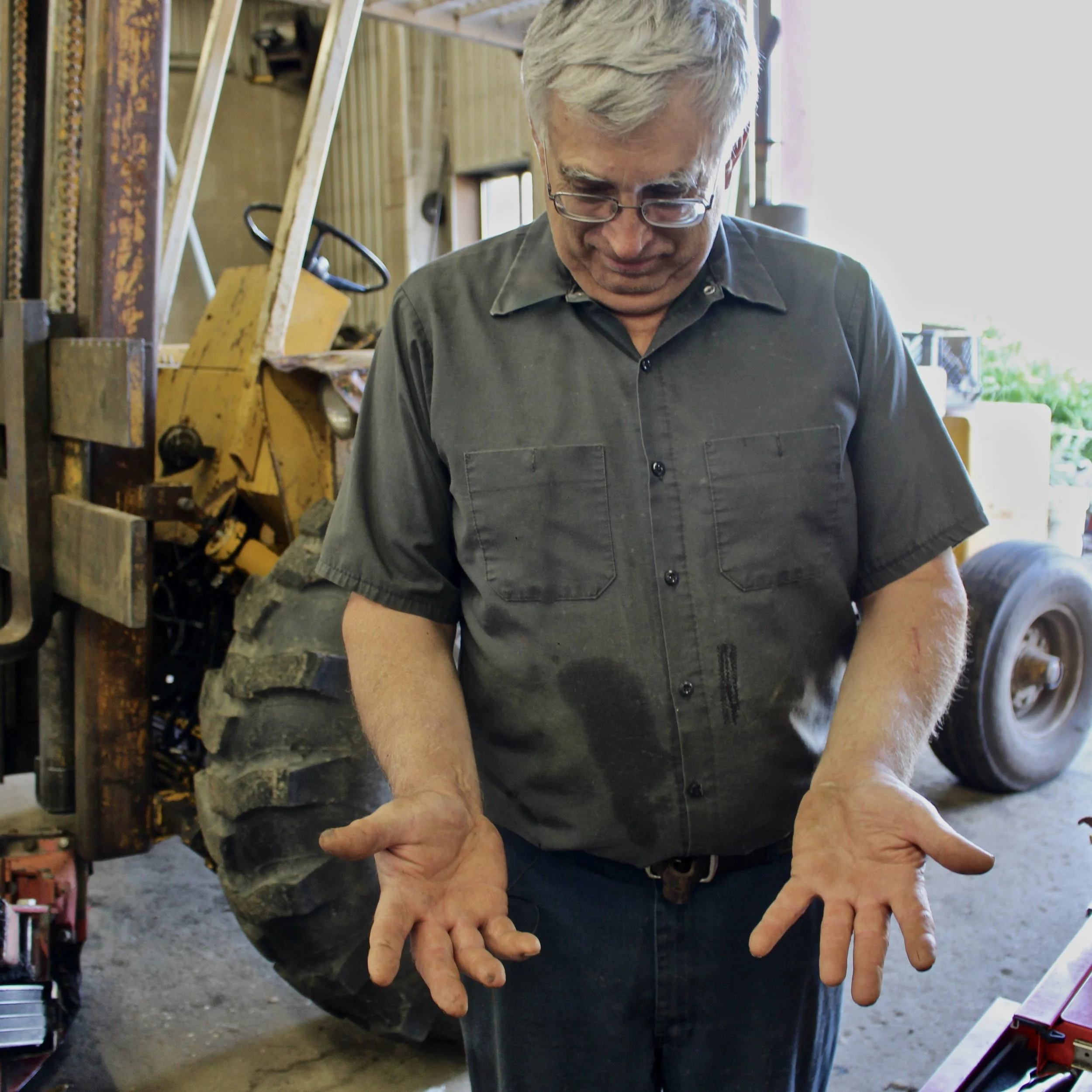The Restauranteur
Main Street in Lewistown has all the charm of a nostalgically imagined 1950s town. Except half the stores are closed. The husks of businesses haunt the streets, staring emptily across the street, often at another closed storefront. Many seem recently closed, like the China Garden, which boasts a confusing array of closed signs. Others have clearly been sitting empty for years.
Poor Man's, also Pourman's Café depending which sign suits your fancy, is one business that hasn't yet succumbed to the weight of the economy. A collection of suntanned men fills the first table through the door. Their conversation follows the contours of polite small talk anywhere, including recapping the week's weather. Yesterday's rain, a conversation generously regarded as trite in Manhattan coffeeshops, commands attention and interest at the table.
“I saw you got some rain yesterday.”
Yeah, I got 2 tenths, and a dead bug. It helps, any rain helps. Need something to settle the dust.
I worry about my guys, they got a lot of money sitting out there. Need some rain to turn this around.”
The table swaps numbers. Some are thinking they'll be out half their crop's value if rain isn't put on the forecast. Everything seems to have a different significance here. This is the world where Tammy runs her restaurant. Named after country legend Tammy Wynette, she was born on a ranch just outside of town. Her childhood was spent near home in Giltedge, an old gold-mining-turned-ghost town just east of Lewistown where she lives now.
“Growing up I lived on the ranch, rode horses, did 4-H. Normal stuff. My parents raised cattle and had hay ground. We rarely came to town on a Sunday because cows had to be fed, so we rode horses to trail them. Now people use formulas and rangers, not many people ride horses anymore, which is sad, it’s an era that went away. But we did that, my two sisters and I, till I went off to college for accounting in Rapid City. I love numbers, wanted to do more with them.
Earlier on I did school activities in Grass Range. My parents had the choice to send us to either Lewistown schools or Grass Range schools and they picked Grass Range. The school was very small, what they call a Class-C school. My graduating class was due to have 13 kids but one kid died in a car wreck so we had 12. These days it’s amazing if they smack the heck out of 3 kids graduating. It’s amazing how our rural areas have deteriorated”
With that little aside, Tammy hinted at one element of the mystery of why town was so sparse, why main street seemed to be a diminished version of itself. The area all around seemed to be evolving in ways that naturally nudge people away from sustaining once vibrant towns like Lewistown. She offered why at least the rural part of the area was drifting from the way she remembered it.
“I think it’s hard to pass ranching or farming from generation to generation. The next generation tends to say I want to make bigger bucks in bigger places. My sister is still on my parents ranch, and we have a neighbor who’s doing the same. So there are a few success stories but most of them aren’t keeping it up. It’s too hard. Land’s too expensive.
You figure it’s anywhere from $3000-$9000 an acre. So you’re talking a chunk of change. That’s the thing about land, my grandmother used to say, once you buy land, it’s not going to make any more land. You can always make more cows, you can make more buses, but there’s no more making more land. So it appreciates at a high rate of speed.
My grandmother and grandfather bought their land way back but they paid pittance compared to what it costs now. They were always saying it was going to tip them over. It didn’t. But now, buying $9,000,000 - $10,000,000 for a 100 acre ranch? You have to have your ducks made someplace else if you’re ever going to afford something like that. ”
Tammy and her husband work in town, a step removed from agriculture now. Her husband came into town when he was still in school because his dad, who worked for the Fish and Wildlife Agency of the government, was relocated for work. Tammy was at first hesitant to say that he worked for the government because of the animosity that such a job can draw in a small town like this. She explains that people assume that government work comes with more money and stability and that is a wedge between people whose livelihoods are a bit more precarious and hard-tack. Even, and perhaps especially in town, it's hard to guess whether your work will stick around. The business closures frame the perspectives, anxieties, and animosities held in town.
“You’ve probably noticed how many shops are closed here. You’ve probably noticed that with a lot of small towns coming through. I think the wave of computers, of buying online with your smartphone, I think that’s hurt our little town economies. People can’t go to Amazon for restaurant food so that’s at least safe for me. But I think that’s a lot of our regression.
It’s been over the last ten years. That most of the closures happened. We had a big store down here called Reid’s. I worked there back in 2003. But when she closed her doors it seemed to go downhill. I think it was probably a cornerstone for us. I have my next door neighbor here, she has this little bookstore here, but she’s diversified into secondhand books and stuff like that. So that’s probably her way of trying to keep her doors open. But it’s hard.
I’ve traveled too, and I’ve seen for example a lot of empty storefronts in Oregon towns. So it’s not just our town, it’s all over.
Right now we have the highest job availability. There’s 200 jobs available just here in our little town. I’ve had postings for work and I’ve had in the past month maybe 4 applications, maybe 4. There’s no people to work. People say it’s because we don’t pay enough wages but I can only pay what I pay. I’ve got rent and electricity and such.
But when the nation looks so good, we still don’t look so good till maybe 4-5 years later. And I don’t think the nation actually looks so good right now. You see help wanted signs everywhere. Where are all of our people? Why are they not working?”
Tammy's town tells the story of towns across the country, beginning to falter now after a thousand papercuts over the years. Children move away from the farms, goods are bought cheaper from box stores or shipped from far off warehouses after an online purchase, local shops shutter without the needed business from everyone in town, jobs vanish, workers leave, towns fade. Lewistown has a more robust core than many of the ghost-towns that punctuate the path leading into the area, but it's easy to imagine a day when it too can no longer weather the erosive sandblasting of local economies.












